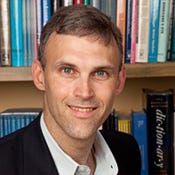Big Data Profile: Jayanth Garlapati, DonorsChoose
Newly hired data scientist Jayanth Garlapati talks about blazing trails and his job helping DonorsChoose mine trends in teaching innovations.


Jayanth Garlapati, data scientist, DonorsChoose
DonorsChooseJayanth Garlapati, data scientist
DonorsChoose.org connects innovative teachers directly with donors who want to fund their projects. The non-profit was started in 2000 by a New York City public school teacher, Charles Best, and has since coordinated $170 million in donations, made to teachers at half the nation's public schools. Last year, it hired a data scientist, Jayanth Garlapati, to help it learn new things about its donors, requesters and impact. For instance, it wanted to know whether it could show that its grant recipients outperformed other teachers.
Name: Jayanth Garlapati, data scientist
Tenure at current job: Started July 1, 2012.
Career accomplishment of which I'm most proud: That's a hard thing for me to answer [because] I'm very early in my career. Right now we're talking with the superintendent of the San Juan school districts, one of the top 10 school districts, as well as budgeting head for some schools in Connecticut, about ways to spend their money. I would feel extremely accomplished if I could influence their budget.
We have looked at whether teachers who use our site are higher performers, using value-added scores from New York City. [The New York City public schools try to measure teachers' "value add" by looking at standardized scores while attempting to control for factors such as the level of student being taught.] We found that teachers who use our site do perform better.
Why do you do what you do? As I was graduating college I was contemplating going to grad school. But I wanted to be working in a situation where I'd be able to use my quantitative skills and ability to work with and do statistics, which I believe is a useful perspective on the world, and bring those tools to bear on a problem of importance to everybody. So I started looking for a job that was working with data. I was looking at several startups, but was really drawn to DonorsChoose, because the core of this organization is its social mission.
Decision I wish I could do over: There are some educational choices I would have maybe made differently, maybe arranged my curriculum differently and learned more statistics early on.
Most important career influencer: A combination of people. One was John Lafferty, a professor in statistics and computer science at Chicago. I took a great class from him. My research advisor is Nina Hinrichs. I was learning this math and it was abstract and I enjoyed learning it, but doing my work with her I got a sense of how I could use that more abstract knowledge to create models and understand the world.
Current top initiatives: We have a lot of raw project data of what teachers need for their classroom. We'd like to get a sense of what are the most important, most requested items. I'm working on aggregating that information, which I think ought to be an easier thing than it is. It's important in terms of understanding what resources are needed and being asked for by innovative teachers in public schools.
Other questions that I'm noodling on, we do a lot of things on our site to encourage or help fundraising. A lot of people draw comparisons between our site and a site like Kickstarter. On Kickstarter you have a group of enterprising entrepreneurs asking for money. They're comfortable doing that. Teachers might not be as comfortable asking friends for money. So we want to know if there is a way in which our site helps teachers fundraise and ask people for money. We're also trying to get an idea of who the donors are who come to our site. Do they have preferences for certain types of projects, are there relationships between donors and projects.?
It's a high-performance marketplace we're trying to optimize, but we also have room to ask questions that are broader, socially interesting questions that could matter outside our site. These questions don't change or affect the site, but could be informative to the education reform community or non-profits trying to understand their site.
Most disruptive force in my industry: It's really I think the whole paradigm of using data to make decisions. There a lot of questions people have been interested in asking for a lot of years. But before, those were answered by gut feeling, or whatever it is people went by. Suddenly, we're able to have factual grounding or data that speaks, in a significant way, to whether we should do "A" or "B." That data, based on concrete decisions rather than feeling, is what makes data science extremely disruptive.
One thing I'm looking to do better: I want to improve the way I communicate results. It's a really important part of the job to take all the mathematical machinery and computing machinery and be able to represent them and communicate them to non-experts or people without quantitative background, so they can understand the strength and the limitations of what you've produced.
Hardest thing about what I'm doing: This whole field is extremely new. As a result, unlike more established fields, you don't have very established best practices, or role models, or people who've done it and you can follow in their paths. A lot of things you have to cobble together as you go. You have to make a lot of judgment calls about what you think is a best practice.
Jayanth Garlapati At A Glance Education: BS in mathematics from the University Of Chicago. Person I'd most like to have lunch with: Robert Noyce. He really started the silicon revolution in a big way, invented the integrated circuit, started Intel labs, is the one that initiated this counterculture of creating organizations with a philosophy of work in mind. He was really an originator in many ways of the startup culture, the flat organization, the open plan office, that's all Robert Noyce. First job: I was a lab assistant/tech at the University of Pennsylvania, near where I lived in high school. I helped with IT support. If I weren't a data scientist: A lot of people I know went into quantitative finance. I would probably be in graduate school if this job didn't exist, studying machine learning.
Can data analysis keep students on track and improve college retention rates? Also in the premiere all-digital Analytics' Big Test issue of InformationWeek Education: Higher education is just as prone to tech-based disruption as other industries. (Free with registration.)
About the Author
You May Also Like






